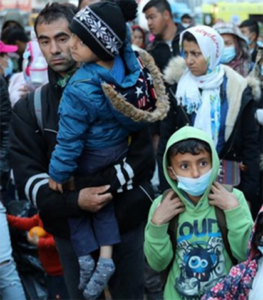Refugees getting the blame for COVID crisis
Refugees and asylum seekers are being falsely blamed for spreading the COVID-19 virus and face stigma and discrimination as the pandemic causes an economic and health crisis across the world, experts say.
The UN refugee agency UNHCR says the pandemic is having a particularly negative effect on refugees and asylum seekers.
 According to the UNHCR, more than 80 per cent of refugees and almost all of the internally displaced people worldwide are taking shelter in low-and-middle-income countries.
According to the UNHCR, more than 80 per cent of refugees and almost all of the internally displaced people worldwide are taking shelter in low-and-middle-income countries.
These people frequently face specific challenges and vulnerabilities that must be taken into consideration in COVID-19 readiness and response operations, according to the UNHCR.
By the end of 2019, global displacement reached 79.5 million people, including 26 million refugees and 4.2 million asylum seekers across the world.
But a raft of new studies show that even though it has no scientific basis, refugees and asylum seekers are being held responsible for spreading the virus in many countries during the pandemic.
And the increased stigma and discrimination towards refugees and asylum seekers has become a problem which affects the internal social cohesion in many countries.
Columbia University public health researcher Dr Ozge Karadag says “stigma and discrimination towards refugees and asylum seekers emerge as a problem which affects the internal peace of many societies”.
German historian and ethicist Professor Michael Knipper said in one report that there are many places where living conditions make refugees and asylum seekers highly vulnerable for catching the virus, including in Syria, Lebanon, Mexico, Colombia, and also in Europe from Germany to the Greek Islands.
“A further problem which links the two areas of structural vulnerability and political neglect is stigma: refugees and asylum seekers are at risk of being identified as carriers of the disease, and when affected due to the living conditions they are not responsible for, the stigma may push politics towards an even stronger approach of exclusion. People who are victims of the situation get blamed,” Prof Knipper said.
The reports say that the living conditions of many asylum seekers and refugees such as crowded spaces and little access to protective measures and information make them highly vulnerable to contracting COVID-19 virus which has killed a million people so far.
Prof Knipper said political neglect was one of the two main reasons refugees and asylum seekers are hit disproportionately hard by the pandemic.
“Political neglect or policies that neglect the universal rights of refugees and asylum seekers is what translates into barriers for accessing health services and health-related information,” he said.
The UN High Commissioner for Refugees Filippo Grandi has called for asylum seekers and refugees to be taken into account in states’ efforts to control the pandemic and urged equal access to reliable health information, testing and treatment for them.
Living and working conditions, which make asylum seekers and refugees more vulnerable to the virus, should be improved, he said.
“Also, it is very important to avoid using stigmatizing language towards asylum seekers and refugees in the media or other messages directed to the public,” Mr Grandi said.
Director of the Johns Hopkins Center for Humanitarian Health Paul Spiegel said many governments, organisations and people ware raising the alarm and stating that these groups are at high risk.
He said humanitarian plans have been prepared, appeals launched but were inadequately funded.
Dr Spiegel said governments could release asylum seekers who are in closed detention facilities and apply the same measures used for nationals to ensure they are not infected and do not spread the virus.
“Governments should consider how any future treatments and vaccines will be rolled out. There is concern that non-nationals – asylum seekers, refugees and migrants – will not be sufficiently included in such a roll-out with insufficient supplies,” he said.
“Besides ensuring equity from a human rights perspective, it makes public health sense to include all people according to set criteria – and not exclude certain groups,” Dr Spiegel said.












